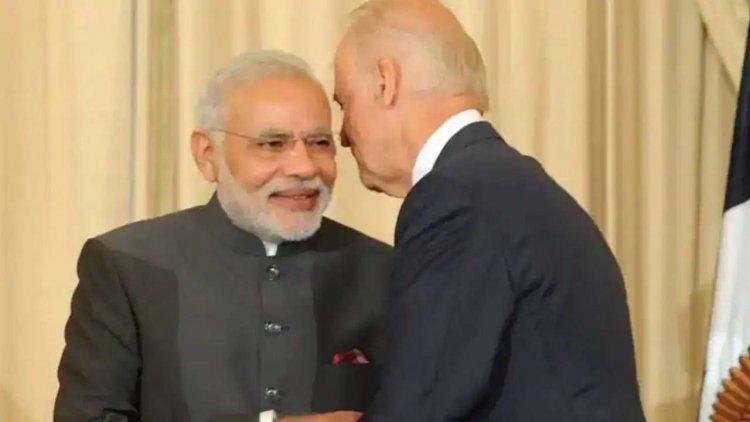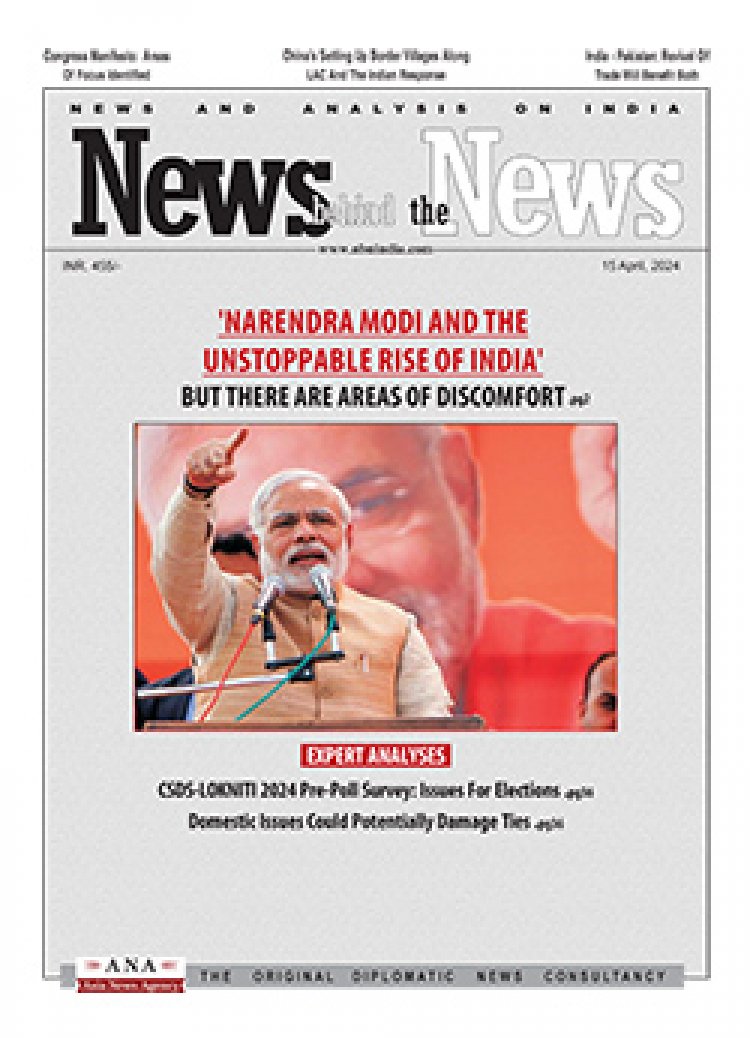India - US: Analysing Modi, Biden Discussions

After Prime Minister Narendra Modi Monday spoke to U.S. President Joe Biden, he tweeted “We discussed regional issues and our shared priorities. We also agreed to further our co-operation against climate change. President Biden and I are committed to a rules based international order. We look forward to consolidating our strategic partnership to further peace and security in the Indo-Pacific region and beyond.”
An open Indo-Pacific: Apart from reiterating their commitment to a strong India-US relationship, the conversation highlight the strategic convergence on a free and open Indo-Pacific. Indeed, notes The Hindustan Times, “the White House statement goes a step further in suggesting that the two leaders agreed on the principles of freedom of navigation, territorial integrity and building a strong regional architecture through Quad. This is good news for India for it is this strategic alignment on China that has driven deeper security, intelligence and defence ties between the two countries.”
Democracy, a binding factor: Discussions about democracy being a binding factor between the two countries, are also significant. The Hindustan Times notes that while the Indian readout of the conversation mentioned that the relationship is ‘firmly anchored in a shared commitment to democratic values’, besides strategic interests, the US statement was more explicit — with President Biden underscoring his ‘desire to defend democratic institutions and norms around the world’. “Once again, this is good news, for it is democracies which must stand at the forefront of battling the authoritarian model presented by China. But this also means that the quality of Indian democracy will emerge in bilateral discussions. The State Department statement on the farm protests last week and the discussion held by the India Caucus on the Hill show that India will have to more effectively underline its democratic credentials to allay apprehensions. Given that the US statement mentioned Myanmar, and India’s did not, there is also a possibility of differences on how to approach democracy promotion in the region and beyond.”
Climate change and terrorism: The two sides also agreed to collaborate more deeply on climate. “Mr Biden will find that India’s position has shifted quite radically from the time he was last in office when New Delhi was viewed as a reluctant partner — India has stopped being defensive on climate and worked on its Paris commitments seriously. And finally, counter-terrorism will continue to rank high on the list of priorities, and the US must internalise that this battle will remain incomplete till it holds Pakistan accountable….”
Issues discussed have much ‘greater diplomatic bandwidth’
According to The Tribune, “the diplomatic bandwidth Biden has sought to cover with Modi is much wider than the security-defence straitjacket Trump imposed on India-US relations. Understandably, climate change and rebuilding the global economy are back in the mix. Quad, an informal group the US is promoting as a bulwark against China, should now embrace all the three pillars it espouses — political and commercial, in addition to military activity in the Indo-Pacific. Biden reiterated his commitment to work together against terrorism………
“However, the Hindutva brigade’s aggressive response to Western criticism of insensitivity in handling the farmers’ protests failed to impress the White House, which has highlighted Biden’s desire to ‘defend democratic institutions and norms’. Democrats in the past did not appreciate the CAA and the Kashmir lockdown either…….”
Emerging international support for the protesting farmers
This is important since the Biden-Modi conversation was held in the backdrop of a series of messages from American celebrities in support of the ongoing protest by the Indian farmers against the new farm laws. Following the crackdown against the farmers, the U.S. State Department had come out on February 4 in support of the right to peaceful protests by the farmers.
This was followed by the comment from Congressman Brad Sherman, co-chair of the India Caucus, in the U.S. House of Representatives who urged the Indian government to ensure “norms of democracy” are maintained while the farmers are allowed to protest peacefully. He also supported the farmers' right to access the Internet.
Celebrities like Rihana and climate activist Greta Thunberg have also supported farmers.
The emerging international support for the protesting farmers has evoked a sharp response from the government that has rejected external meddling in India’s internal affairs.
India’s real challenge is the deepening domestic political divide: India’s problem, writes C Raja Mohan (director, Institute of South Asian Studies, National University of Singapore and a contributing editor on international affairs for The Indian Express) “is not with external criticism, which in any case, is not too difficult to handle. India’s real challenge is the deepening domestic political divide. The inevitable extension of this divide to the diaspora has created more favourable conditions for foreign meddling.
“The intensity of international scrutiny and Delhi’s rejection have varied over time and space, but they are unlikely to ever disappear. As India becomes more deeply connected to the world and its footprint widens, there will be more global interest in its internal dynamics. At the same time, like all rising powers, India will push back against demands that it must always measure up to external expectations.”
The lesson from history however, is that during international pressure on issues like Kashmir, once “Delhi began to engage with US Congress and explained the complexity of the issues involved, the tide began to turn. The Indian diaspora helped by reaching out to their representatives and pressing them to reconsider their positions. Within a decade, supporters of separatism in Punjab and Kashmir could not even move the resolutions in the US Congress.”
Delhi’s task however, “is terribly complicated by the unprecedented domestic polarisation, and amplifies internal disputation and invites external intervention.
“The government’s ability to overcome the growing external criticism of its policies depends crucially on rebuilding the national consensus on key policies and healing the multiple social rifts. Without a visible and sincere political effort to promote unity at home, internal divisions will get worse and make India more vulnerable to external meddling.”
Government’s subtle foreign policy offensive
Making an interesting point, in this context, is Jyoti Malhotra (National & Strategic Affairs Editor, The Print). Indian foreign policy, she says “is taking new and interesting turns” both “inside and outside Parliament.”
“From Modi laughing contemptuously at “professional protesters” (‘andolan jivis’) and warning about the perils of “FDI” or “foreign destructive ideology” to the Rashtriya Swayamsevak Sangh (RSS) expanding its circle of intimacy with retired ambassadors and encouraging them to speak up,
“First, the prime minister. Now Modi well knows that he and his government may be dragged through the mud for a few seconds of infamy abroad, whether it’s about the farmers’ protests this year or the Citizenship (Amendment) Act or CAA a year ago — but he also knows, at the end of the day, the battle for India’s throne must be fought inside India.
“That whatever Meena Harris, Rehana or Geta Thunberg may say from the comforts of their homes abroad, they are not coming here to fight on behalf of a weak and supine opposition.”
So when Modi tweeted Monday that he and Biden had spoken to each other about ‘shared priorities’ and their ‘commitment to a rules-based international order’, Malhotra says “it was clear that he wanted the US to move on from its implied criticism of the farmers’ protests.”
RSS engaging with a group of retired ambassadors
Meanwhile, writes Malhotra “other interesting things are happening on the foreign policy front. The RSS is believed to have been engaging with a group of retired ambassadors (and other retired professionals, for example, from the armed forces) for some months and encouraging them to speak up on a variety of initiatives that are largely supportive of the Modi government.
“So far, three statements have been issued by the ‘Indian Ambassadors Group’ — support to France’s Emmanuel Marcon on countering radical Islam, criticism of Canadian PM Justin Trudeau on the farmers’ agitation, and an ‘open letter to the WTO’, which aims to reveal the hypocrisy of Western nations pushing India to get rid of farm subsidies and demonising Modi’s farm laws.”
Constitutional Conduct Group: On the other side of the spectrum “retired diplomats such as former foreign secretaries Shyam Saran, Shivshankar Menon and former ambassador Deb Mukharji are part of a cross-services group of retired bureaucrats called the Constitutional Conduct Group, which is often critical of the Modi government – including on the farm laws.”
















